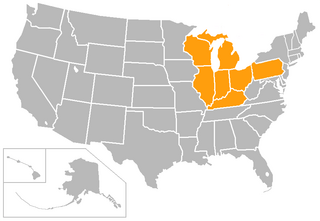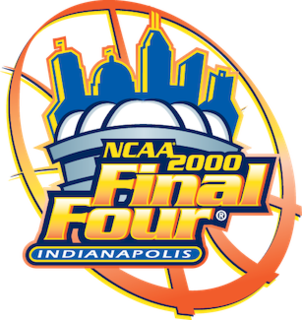Related Research Articles
The NCAA Division I women's basketball tournament is a single-elimination tournament played each spring in the United States, currently featuring 68 women's college basketball teams from the Division I level of the National Collegiate Athletic Association (NCAA), to determine the national championship.

The Horizon League is an 11-school collegiate athletic conference in the National Collegiate Athletic Association (NCAA) Division I, whose members are located in and near the Great Lakes region.

The 2006 NCAA Division I men's basketball tournament involved 65 teams playing in a single-elimination tournament to determine the national champion of men's NCAA Division I college basketball as a culmination of the 2005–06 basketball season. It began on March 14, 2006, and concluded on April 3 at the RCA Dome in Indianapolis, Indiana.

The 2007 NCAA Division I men's basketball tournament involved 65 teams playing in a single-elimination tournament to determine the national champion of men's NCAA Division I college basketball as a culmination of the 2006–07 basketball season. Team selections were announced on March 11, 2007, and the tournament began on March 13, 2007, with the Opening round game and concluded with the championship game on April 2 at the Georgia Dome in Atlanta, Georgia.

The 2008 NCAA Division I men's basketball tournament involved 65 schools playing in a single-elimination tournament to determine the national champion of men's NCAA Division I college basketball as a culmination of the 2007–08 basketball season. The 70th annual edition of the tournament began on March 18, 2008, and concluded on April 7 at the Alamodome in San Antonio.

The 1991 NCAA Division I men's basketball tournament involved 64 schools playing in single-elimination play to determine the national champion of men's NCAA Division I college basketball. It began on March 14, 1991, and ended with the championship game on April 1 in Indianapolis, Indiana. A total of 63 games were played.

The 1997 NCAA Division I men's basketball tournament involved 64 schools playing in single-elimination play to determine the national champion of men's NCAA Division I college basketball. It began on March 13, 1997, and ended with the championship game on March 31 in Indianapolis, Indiana at the RCA Dome. A total of 63 games were played.

The 2000 NCAA Division I men's basketball tournament involved 64 schools playing in single-elimination play to determine the national champion of men's NCAA Division I college basketball. It began on March 16, 2000, and ended with the championship game on April 3 in Indianapolis, Indiana at the RCA Dome. A total of 63 games were played.

The North Dakota State Bison is the name of the athletic teams of North Dakota State University (NDSU), which is located in the city of Fargo, North Dakota. The teams are often called the "Thundering Herd". The current logo is a bison.
An upset is a victory by an underdog team. In the context of the NCAA Division I men's basketball tournament, a single-elimination tournament, this generally constitutes a lower seeded team defeating a higher-seeded team; a widely recognized upset is one performed by a team ranked substantially lower than its opponent.

The Florida Gators men's basketball team represents the University of Florida in the sport of basketball. The Gators compete in NCAA Division I's Southeastern Conference (SEC). Home games are played in the Exactech Arena at the Stephen C. O'Connell Center on the university's Gainesville, Florida campus.

The VCU Rams are the athletic teams of Virginia Commonwealth University of Richmond, Virginia, United States. The Rams compete in Division I of the National Collegiate Athletic Association as members of the Atlantic 10 Conference. The most successful teams have been the men's tennis and basketball teams, which have had success in their conference and on the regional and national stages. The school's colors are black and gold. The athletic director is Ed McLaughlin. The official student supporter group is known as the Rowdy Rams.

The 2007 NCAA Division I Women's Volleyball Tournament began on November 29, 2007, with 64 teams and concluded on December 15, 2007, when Penn State defeated Stanford 3 games to 2 in Sacramento, California for the program's second NCAA title.

The 2006 NCAA Division I Women's Volleyball Tournament began on November 30, 2006 with 64 teams and concluded on December 16, 2006, when top ranked Nebraska defeated second ranked Stanford 3 sets to 1 in Omaha, Nebraska for the program's third NCAA title.

The 2005 NCAA Division I Women's Volleyball Tournament began on December 1, 2005 with 64 teams and concluded on December 17, 2005, when Washington defeated Nebraska 3 games to 0 in San Antonio, Texas for the program's first NCAA title.

The 2012 NCAA Division I men's basketball tournament was a single-elimination tournament involving 68 schools playing to determine the national champion of men's NCAA Division I college basketball. The 74th edition of the tournament began on March 13, 2012, and concluded with the championship game on April 2 at the Mercedes-Benz Superdome in New Orleans.

The 2013 NCAA Division I women's basketball tournament was played from March 23 through April 9, 2013. Tennessee continued its streak of making every NCAA Women's Basketball Tournament at 32 consecutive appearances. Kansas made the Regional Semifinals for the second year in a row as a double-digit seed, UConn made it into the Final Four for the sixth consecutive year, the longest such streak, and Louisville became the first team seeded lower than fourth in a region to advance to the championship game. For the first time in tournament history, the same four teams were #1 seeds as in the previous year.

The 2016 NCAA Division I men's basketball tournament involved 68 teams playing in a single-elimination tournament to determine the men's National Collegiate Athletic Association (NCAA) Division I college basketball national champion for the 2015–16 season. The 78th edition of the Tournament began on March 15, 2016, and concluded with the championship game on April 4 at NRG Stadium in Houston, Texas.

The 2021 NCAA Division I men's basketball tournament was a single-elimination tournament of 68 teams to determine the National Collegiate Athletic Association (NCAA) Division I men's college basketball national champion for the 2020–21 season. The 82nd edition of the tournament began play on March 18, 2021 in sites around the state of Indiana, and concluded with the championship game at Lucas Oil Stadium in Indianapolis on April 5, with the Baylor Bears defeating the previously undefeated Gonzaga Bulldogs 86–70 to earn the team's first ever title.

The 2022 NCAA Division I men's basketball tournament involved 68 teams playing in a single-elimination tournament that determined the National Collegiate Athletic Association (NCAA) Division I men's college basketball national champion for the 2021–22 season. The 83rd annual edition of the tournament began on March 15, 2022, and concluded with the championship game on April 4 at the Caesars Superdome in New Orleans, Louisiana, with the Kansas Jayhawks defeating the North Carolina Tar Heels, 72–69, to claim the school’s fourth national title.
References
- 1 2 "No. 16 Harvard over No. 1 Stanford still resonates 10 years later". ESPN.com . Associated Press. March 18, 2008. Retrieved March 26, 2013.